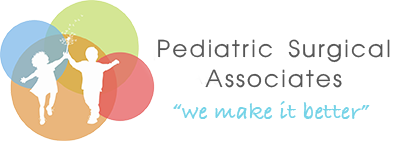Pectus Excavatum Nuss Surgery
Your Orange County Surgeons at Pediatric Surgical Associates specialize in the treatment of chest wall deformities, or Pectus Excavatum Nuss Surgery, in children – a common structural abnormality in the children’s chests.
Chest wall deformity may appear in newborn babies, but some children can develop this deformity during the early stages of childhood. These deformities can develop as late as age 9 or 10. Any type of deformation after age 10 is highly unlikely.
Chest Wall Deformities Surgery Information
Symptoms of Chest Wall Deformities in Children
Newborn infants may have the following symptoms:
- Breathing difficulties
- Depression in the chest
- Colds that can develop into pneumonia
Symptoms of funnel chest in older children may include:
- Respiratory infections
- Breathing difficulties when exercising
- Chest pain
- Abnormal posture
Pigeon chest symptoms include:
- Pain around the overgrown cartilage
- Having a hard time when playing or exercising
These symptoms may also correspond with other medical conditions. Please consult your Orange County chest wall deformity specialists at the Pediatric Surgical Associates for a more accurate diagnosis.
Causes of Chest Wall Deformities in Children
Genes may be the cause of chest wall deformity, though the exact causes of the deformation are still unknown. Doctors have sometimes associated pigeon chest that appears during the birth of the baby with congenital heart disease.
Diagnosis of Chest Wall Deformities in Children
At Pediatric Surgical Associates, we diagnose chest deformities through physical examination and by observing the child when he or she is breathing. Additional special imaging may be required to confirm diagnosis. For example, front and back X-rays may be needed to measure the chest diameter, determining if the child has a funnel chest or a pigeon chest.
Other tests used for an accurate diagnosis are:
- Electrocardiogram – this test examines the electrical activity of the child’s heart.
- Echocardiogram – this evaluates the child’s heart activity by the use of sound waves that are recorded on an electronic sensor.
Surgical Treatments for Children with Chest Wall Deformities
For mild cases of either condition, there’s really no reason for surgical intervention. The best time for treatment for a child that does not need immediate intervention is when they have reached the puberty stage or teen years to avoid recurrence during the growth spurts.
In cases of severe funnel chest, the deformity can compress your child’s heart and lungs. With severe cases of pigeon chest, the issue is more with form than physiology and some children suffer psychologically from the deformity.
Funnel Chest Treatment
The Orange County chest wall specialists at the Pediatric Surgical Associates treat funnel chest by conducting one of two surgical options for children:
- Welsh Technique – In this procedure, the pediatric surgeon will make an incision across the chest wall to remove the growing cartilage wedged between the ribs and breast bone, and then re-position the breastbone. A steel bar will then be placed under the chest wall to maintain the shape until the cartilage regrows, which is approximately 6 months. This technique yields great results, but leaves a visible scar on the chest. After the surgery, your child has to refrain from contact sports or any activities that might involve a collision.
- Nuss Technique – With this procedure, a steel bar is inserted laterally through two small incisions under both arms to lift the breastbone and remold the growing cartilage. No cartilage is removed in this procedure and scarring is minimal. With the Nuss Technique, it takes between one to two years before the bar can be removed.
Pigeon Chest Treatment
The Welsh technique (see above) can also be used to treat pigeon chest. The other option is to use an external brace to correct the shape of the deformed chest wall.
Your Orange County chest wall specialists at the Pediatric Surgical Associates specialize in all of the above techniques and are ready to discuss the best option with the best possible outcome for your child. Call 714-361-4480 or Contact Us for more information or to make an appointment.

